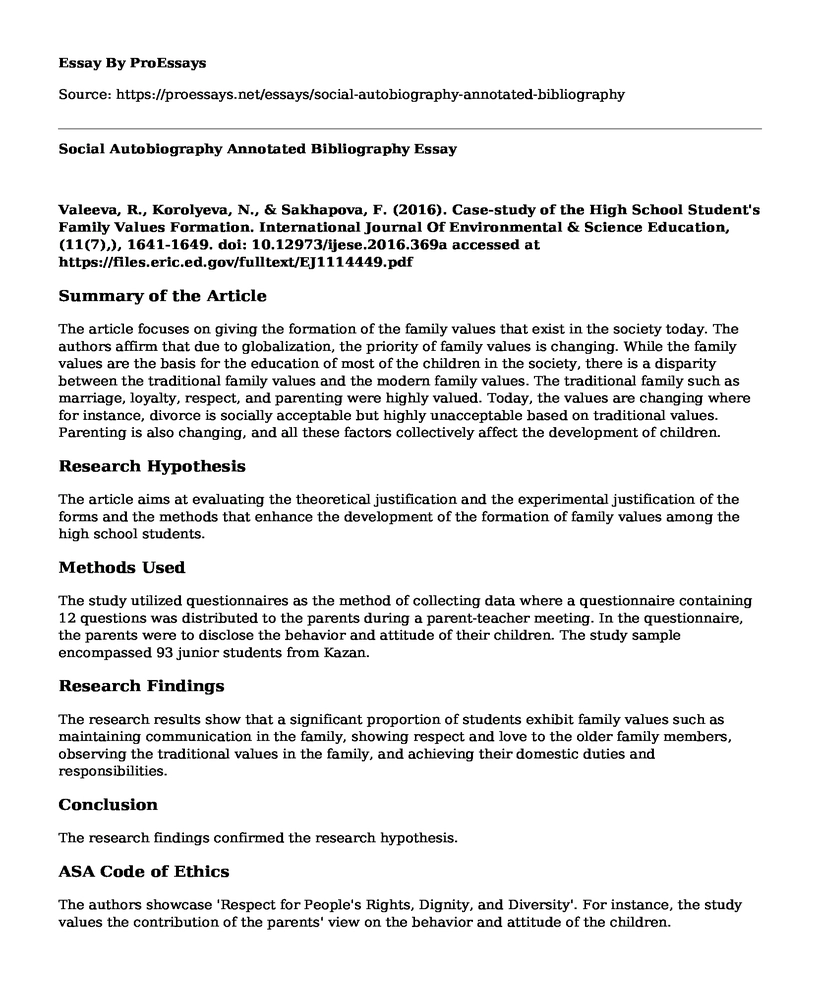Valeeva, R., Korolyeva, N., & Sakhapova, F. (2016). Case-study of the High School Student's Family Values Formation. International Journal Of Environmental & Science Education, (11(7),), 1641-1649. doi: 10.12973/ijese.2016.369a accessed at https://files.eric.ed.gov/fulltext/EJ1114449.pdf
Summary of the Article
The article focuses on giving the formation of the family values that exist in the society today. The authors affirm that due to globalization, the priority of family values is changing. While the family values are the basis for the education of most of the children in the society, there is a disparity between the traditional family values and the modern family values. The traditional family such as marriage, loyalty, respect, and parenting were highly valued. Today, the values are changing where for instance, divorce is socially acceptable but highly unacceptable based on traditional values. Parenting is also changing, and all these factors collectively affect the development of children.
Research Hypothesis
The article aims at evaluating the theoretical justification and the experimental justification of the forms and the methods that enhance the development of the formation of family values among the high school students.
Methods Used
The study utilized questionnaires as the method of collecting data where a questionnaire containing 12 questions was distributed to the parents during a parent-teacher meeting. In the questionnaire, the parents were to disclose the behavior and attitude of their children. The study sample encompassed 93 junior students from Kazan.
Research Findings
The research results show that a significant proportion of students exhibit family values such as maintaining communication in the family, showing respect and love to the older family members, observing the traditional values in the family, and achieving their domestic duties and responsibilities.
Conclusion
The research findings confirmed the research hypothesis.
ASA Code of Ethics
The authors showcase 'Respect for People's Rights, Dignity, and Diversity'. For instance, the study values the contribution of the parents' view on the behavior and attitude of the children.
The Relevance of the Article in Social Autobiography
The article is relevant in the study as it discusses family values as a sociological aspect that shapes the behavior and development of children.
Patterson, J., Hale, D., & Stessman, M. (2007). Cultural Contradictions and School Leaving: A Case Study of an Urban High School. The High School Journal, 91(2), 1-15. doi: 10.1353/hsj.2008.0001 accessed at https://www.jstor.org/stable/pdf/40364136.pdf
Summary of the Article
The article outlines how cultural contradictions contribute to the rate of school leaving the society. While higher level education is considered as significant in the society, some cultural values such as racial disparities have a significant contribution to the increased rate of school dropouts among the minority households in the United States.
Research Hypothesis
The contradictions between the family culture and school culture affect the rate of school leaving in the society.
Methods Used
The study used various techniques to collect data including interviews, review of documents, and focused groups. The sample consisted of 68 stakeholders of Prairie High who provided opinion considering the increased dropout rate within the school. There were a total of 8 interviews and three focus groups.
Research Findings
The results revealed that there was a contradiction between the school value and family values. For instance, the faculty staff mentioned values and further outlined actions that were inconsistent with these values. It was noted that the staff members perceive that the students from the minority and low-income earners are low performers and do not value education.
Conclusion
The findings proved that cultural contradiction in schools and the family structures contribute to the increased rate of school leaving.
ASA Code of Ethics
The authors maintain 'integrity'. For instance, while collecting the data, the authors ensure that administrators select a sample that maintains a balance regarding gender, ethnicity, age, and religion.
The Relevance of the Article in Social Autobiography
The article is relevant as it the study as it explains the variation of social values and their effect on the development of education in the society. More importantly, it describes the everyday experiences in many colleges today.
References
Patterson, J., Hale, D., & Stessman, M. (2007). Cultural Contradictions and School Leaving: A Case Study of an Urban High School. The High School Journal, 91(2), 1-15. doi: 10.1353/hsj.2008.0001 accessed at https://www.jstor.org/stable/pdf/40364136.pdf
Valeeva, R., Korolyeva, N., & Sakhapova, F. (2016). Case-study of the High School Student's Family Values Formation. International Journal Of Environmental & Science Education, (11(7),), 1641-1649. doi: 10.12973/ijese.2016.369a accessed at https://files.eric.ed.gov/fulltext/EJ1114449.pdf
Cite this page
Social Autobiography Annotated Bibliography. (2022, Mar 27). Retrieved from https://proessays.net/essays/social-autobiography-annotated-bibliography
If you are the original author of this essay and no longer wish to have it published on the ProEssays website, please click below to request its removal:
- The Influence of Groups in Ancient Societies and Cleopatra's Leadership Essay
- Essay Sample on The United States Multiple Conflicts
- Essay Sample on Race & White Privilege: Stereotypes, Prejudice, Discrimination & Racism
- Literacy as a Commodity: Public Good or Private Benefit? - Essay Sample
- Effective Business Communication: Connected Employees = Higher Performance
- U.S. Population in 2030: Rising Older Generation Challenges Demographics - Essay Sample
- Leasehold Estate: Rights & Responsibilities of Tenants & Landlords - Essay Sample







